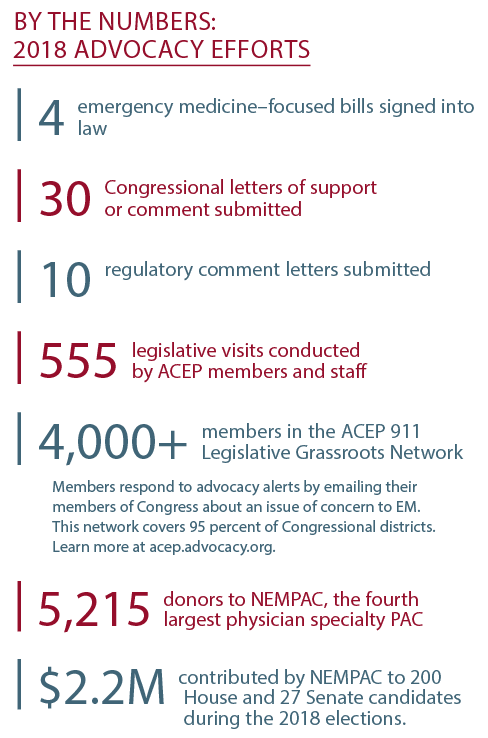Over the last year, ACEP’s strong federal advocacy efforts have been rewarded with numerous, and significant, legislative victories, resulting in one of the most productive years in ACEP’s history. ACEP successfully secured passage of four emergency medicine–focused bills that were signed into law:
Explore This Issue
ACEP Now: Vol 37 – No 12 – December 2018- The Protecting Patient Access to Emergency Medications Act to provide needed clarity on EMS “standing orders” of key medications in the field, like opioids
- The Sharing Health Information to Ensure Lifesaving Drug Safety (SHIELDS) Act, included in the 2019 National Defense Authorization Act, to facilitate sharing of prescribing information for active-duty military members and their families between the Department of Defense and state prescription drug monitoring programs
- The Alternatives to Opioids (ALTO) in the Emergency Department Act to expand access to alternative pain management treatments in the emergency department
- The Preventing Overdoses While in Emergency Rooms (POWER) Act to help expand medication-assisted treatment programs for treating patients with substance-use disorders (SUDs) in the emergency department and providing a “warm hand-off” to longer term SUD treatment programs.
 In addition to these specific ACEP-led and -developed priorities, ACEP also helped secure several other long-term victories in Congress’ bipartisan budget deal passed in February 2018, including repeal of Medicare’s Independent Payment Advisory Board, a two-year extension of the geographic practice cost index work floor, a five-year extension of Medicare ambulance add-on payments, and $6 billion in additional funding to address the opioid epidemic. We were also able to help deliver 10 years of funding for the Children’s Health Insurance Program, ensuring funding through 2027.
In addition to these specific ACEP-led and -developed priorities, ACEP also helped secure several other long-term victories in Congress’ bipartisan budget deal passed in February 2018, including repeal of Medicare’s Independent Payment Advisory Board, a two-year extension of the geographic practice cost index work floor, a five-year extension of Medicare ambulance add-on payments, and $6 billion in additional funding to address the opioid epidemic. We were also able to help deliver 10 years of funding for the Children’s Health Insurance Program, ensuring funding through 2027.
ACEP also led the charge in addressing the worsening drug shortages that affect emergency departments throughout the country, working with Congress to request that the U.S. Food and Drug Administration (FDA) identify the root causes of drug shortages and develop solutions to address and eliminate these pervasive shortages of the medications we use every single day in the emergency department. Thanks to ACEP member advocacy during the 2018 Legislative & Advocacy Conference, more than 100 representatives and more than 30 senators signed on to the bipartisan letters. Just a few short weeks later, FDA Commissioner Scott Gottlieb announced the creation of a new Drug Shortages Task Force responsible for identifying and addressing the causes of drug shortages, and since then, ACEP has participated in stakeholder roundtables and communications with the FDA as it continues to work on this critical agency priority.
The unifying theme across all of these victories is bipartisanship. Despite the contentiousness of the political environment, legislators reached across the aisle to enact meaningful changes that will help emergency physicians provide the high-quality care our patients need and deserve.
Pages: 1 2 | Single Page




No Responses to “ACEP’s 2018 Legislative Update, by the Numbers”